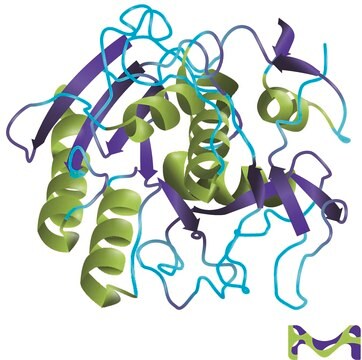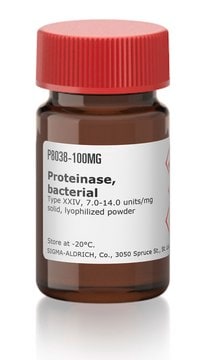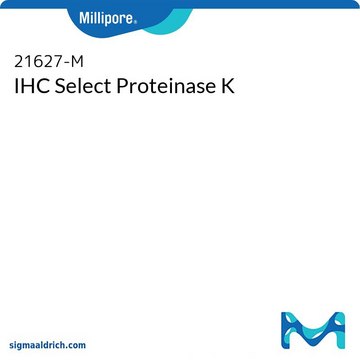1.07393
Proteinase K
(from Tritirachium album) solution in Tris/HCl pH 7.5; 0.01 mol/l; 600 mAnson-U/ml; for molecular biology EC 3.4.21.14
Sinónimos:
ProK, native proteinase K solution, non-specific protease
Iniciar sesiónpara Ver la Fijación de precios por contrato y de la organización
About This Item
UNSPSC Code:
12352204
NACRES:
NA.51
Productos recomendados
Quality Level
form
liquid
pH
7.5 (25 °C in H2O, undiluted)
density
1.10 g/cm3 at 20 °C
storage temp.
2-8°C
General description
Proteinase K is an endopeptidase that belongs to the subtilisin family of proteinases. The polypeptide chain contains 278 amino acids with the catalytic triad Asp39, His69, Ser224.
Application
Proteinase K has been used:
- to de-crosslink immunoprecipitated samples
- to treat the poly-L-lysine coated slides of colon tissues for terminal deoxynucleotidyl transferase dUTP nick end labeling (TUNEL) assay
- in in situ hybridization
Biochem/physiol Actions
Proteinase K catalyzes the hydrolysis of esters and peptide bonds. It is used with non-aqueous hydrated solvents for synthesizing peptides. Proteinase K is used to break the cross-linking that develops secondary to formalin fixation and expose the target sequence for primers and polymerase.
Analysis Note
Appearance (colour): colourless
Appearance (clearness): clear
Activity (hemoglobin; pH 7.5; 37 °C): ≥ 600 mAnsonU/ml
Spec. activity (calc. on protein): ≥ 40.0 mAnsonU/mg
DNases (Nicking activity; pBR 322; 6 h; 37 °C): not detectable
RNases (RNA; 2 h; 37°C): not detectable
Colony count (aerobic bacteria): ≤ 10 CFU/ml
Appearance (clearness): clear
Activity (hemoglobin; pH 7.5; 37 °C): ≥ 600 mAnsonU/ml
Spec. activity (calc. on protein): ≥ 40.0 mAnsonU/mg
DNases (Nicking activity; pBR 322; 6 h; 37 °C): not detectable
RNases (RNA; 2 h; 37°C): not detectable
Colony count (aerobic bacteria): ≤ 10 CFU/ml
signalword
Danger
hcodes
pcodes
Hazard Classifications
Resp. Sens. 1
Storage Class
12 - Non Combustible Liquids
wgk_germany
WGK 1
flash_point_f
Not applicable
flash_point_c
Not applicable
Certificados de análisis (COA)
Busque Certificados de análisis (COA) introduciendo el número de lote del producto. Los números de lote se encuentran en la etiqueta del producto después de las palabras «Lot» o «Batch»
¿Ya tiene este producto?
Encuentre la documentación para los productos que ha comprado recientemente en la Biblioteca de documentos.
Los clientes también vieron
F Chavagnat et al.
Applied and environmental microbiology, 65(7), 3001-3007 (1999-07-02)
The general aminopeptidase PepN from Streptococcus thermophilus A was purified to protein homogeneity by hydroxyapatite, anion-exchange, and gel filtration chromatographies. The PepN enzyme was estimated to be a monomer of 95 kDa, with maximal activity on N-Lys-7-amino-4-methylcoumarin at pH 7
María Isabel Navarro-Mendoza et al.
Current biology : CB, 29(22), 3791-3802 (2019-11-05)
Centromeres are rapidly evolving across eukaryotes, despite performing a conserved function to ensure high-fidelity chromosome segregation. CENP-A chromatin is a hallmark of a functional centromere in most organisms. Due to its critical role in kinetochore architecture, the loss of CENP-A
Nuestro equipo de científicos tiene experiencia en todas las áreas de investigación: Ciencias de la vida, Ciencia de los materiales, Síntesis química, Cromatografía, Analítica y muchas otras.
Póngase en contacto con el Servicio técnico







